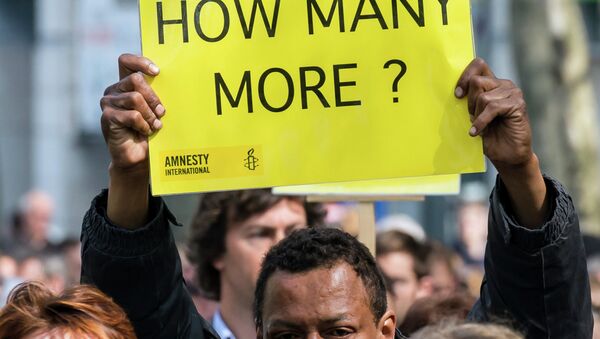In a scathing attack on Britain's foreign policy exploits over the past decades, Miliband, as part of a discussion on Britain's position in the world, says that the recent deaths of 900 asylum seekers is in part due to the UK's failure to secure peace in the region, following their 2011 intervention to topple former leader Muammar Gaddafi.
"David Cameron was wrong to assume that Libya's political culture and institutions could be left to evolve and transform on their own," Miliband said.
Despite Miliband himself personally supporting action in Libya, he said that a failure by the EU and British governments to ensure stability and peace after the intervention led to many people risking their lives to flee the widespread violence in the country.
This is the bit of Ed Miliband’s foreign policy speech which mentions Libya — I don’t see what’s wrong with it pic.twitter.com/VfUrKYIxaL
— Mark Ferguson (@Markfergusonuk) April 24, 2015
However, Mr Cameron hit back, saying the loss of life has been appalling, while calling Miliband's comments "ill-judged" and noting that Britain was leading the charge trying to defeat people smugglers.
Britain Needs to Learn 'Vital Lessons' From Iraq Mistakes
Despite attracting criticism from government officials for having little to say on foreign policy, Miliband highlighted how his Labour party prevented the UK from entering armed conflict against Bashar al-Assad's Syrian government forces in 2013, by defeating a motion put forward by the Prime Minister in the House of Commons.
In a further indictment of Britain's foreign policy history, Miliband took the unusual step of criticizing his own party — under the leadership of Tony Blair — for supporting the US-led invasion of Iraq in 2003, saying that he would not forget the "vital lessons" of such military interventions in the future.
Ed Miliband's full speech on foreign policy http://t.co/GmbJNtCWuH pic.twitter.com/MCsDxWeJIj
— PoliticsHome (@politicshome) April 24, 2015
Miliband believes that more diplomatic and political means must be employed to tackle to rise of extremism and radicalization, rather than solely relying on military action.
UK officials have been widely criticized by political and media figures in recent times for their foreign exploits, with Westminster being accused of not having an independent foreign policy of its own, and simply following the actions of Washington.
For Ed Miliband to support the bombing of Libya and then complain four years later about the consequences is low even by his standards.
— spiked (@spikedonline) April 24, 2015
Meanwhile, he also says more attention must be paid to post-conflict planning, to avoid the post-war outbreaks of violence and instability experienced in Afghanistan and Iraq, accusing the government of disengaging with the local situation in the past.
Call to Oust 'Small-Minded Isolationism'
Meanwhile, further expanding on his attack of Britain's recent foreign policy, Miliband says the anti-EU rhetoric being pursued by David Cameron's government has led to the "biggest loss of influence for our country in a generation."
Watching @Ed_Miliband's speech?Remember Said Gaddafi sponsored the Ralph Miliband Memorial Lecture. See here: http://t.co/eSB6DWZhPL
— Guido Fawkes (@GuidoFawkes) April 24, 2015
The Labour leader been widely critical of Mr Cameron's pledge to give the British public the chance to vote in an in/out referendum on EU membership, accusing the Prime Minister of risking the country's national interests to appease the Euroskeptic elements of UK politics.
"It is time to reject the small-minded isolationism that has characterized this government, diminished the office of prime minister and shrunk the influence of Britain. Because this Government's approach has and weakened Britain at a time when the challenges are perhaps greater and more complex than at any time since the Second World War."
However, Cameron has said he is willing to fight Brussles for greater powers for Britain within the EU, arguing that it is only fair to give the public the chance to decide whether they want to stay in the European Union.



